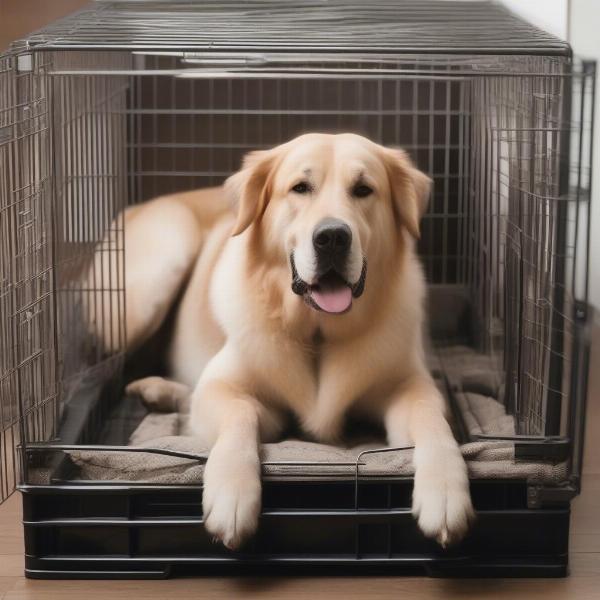Choosing the right indoor dog cage for a large dog can be a daunting task. With so many options available, it’s important to consider your dog’s size, breed, temperament, and your home environment. This guide will help you navigate the process of selecting the perfect indoor cage, ensuring your furry friend has a comfortable and safe space.
Factors to Consider When Choosing an Indoor Dog Cage for a Large Dog
Before diving into the specifics of cage types, let’s consider the key factors that will influence your decision. Think of it like finding the perfect apartment – location, size, and amenities all matter!
-
Size Matters: Obviously, the bigger your dog, the larger the cage needs to be. Your dog should be able to stand comfortably, turn around, and lie down without feeling cramped. Measure your dog’s height and length to determine the minimum cage dimensions.
-
Breed Specific Needs: Some large breeds, like Great Danes, may require taller cages, while others, like Mastiffs, might need more floor space. Research your breed’s specific needs to ensure a good fit.
-
Temperament: A dog with anxiety or destructive tendencies might benefit from a heavy-duty cage with reinforced bars. A calmer dog may be perfectly content in a standard wire crate.
-
Home Environment: Where will the cage be placed? Consider the available space and the aesthetics of your home. A decorative wooden crate might blend in better with your decor than a metal one.
Types of Indoor Dog Cages for Large Dogs
There are several types of indoor dog cages suitable for large breeds, each with its pros and cons.
Wire Crates
Wire crates offer excellent ventilation and visibility, allowing your dog to see what’s happening around them. They are also relatively lightweight and easy to clean. However, they may not be suitable for dogs who are prone to chewing or escaping.
Heavy-Duty Cages
These cages are constructed from thicker metal and are ideal for strong or anxious dogs. They provide maximum security and durability. However, they can be heavier and more expensive than wire crates.
Decorative Wooden Crates
Wooden crates can be a stylish addition to your home decor, blending seamlessly with your furniture. They offer a more den-like feel for your dog. However, they can be more difficult to clean and may not be suitable for all breeds.
Soft-Sided Crates
These crates are lightweight and portable, making them ideal for travel. They are generally not as durable as wire or heavy-duty crates and are not recommended for dogs who are prone to chewing or escaping.
Setting Up Your Dog’s Indoor Cage
Creating a comfortable and inviting space inside the cage is crucial.
-
Bedding: Choose comfortable, washable bedding. Avoid shredded paper or cedar chips, which can be harmful if ingested.
-
Toys: Provide a few safe and durable toys to keep your dog entertained.
-
Food and Water: Ensure fresh water is always available. You can use a bowl that attaches to the cage or place a heavy, spill-proof bowl inside.
-
Training: Introduce the cage gradually and positively. Never use it as punishment.
“Creating a positive association with the cage is key to a happy dog,” says Dr. Emily Carter, DVM, a leading veterinary behaviorist. “Make it a safe haven, not a prison.”
What Size Cage Do I Need for My Large Dog?
Choosing the correct size is critical. A cage that is too small will be uncomfortable, while one that is too large can defeat the purpose of crate training. Measure your dog from nose to tail and from the floor to the top of their head while standing. Add a few inches to each measurement to ensure enough room.
 A large dog comfortably inside a properly sized crate
A large dog comfortably inside a properly sized crate
Conclusion
Choosing the right indoor dog cage for a large dog requires careful consideration of several factors. By understanding your dog’s needs and the available options, you can create a comfortable and secure space for your furry companion. Remember, a well-chosen cage can be a valuable tool for training, safety, and providing a sense of security for your dog.
FAQ
-
How do I introduce my dog to its new cage? Gradually and positively, using treats and praise.
-
Can I leave my dog in its cage all day? No, dogs need regular exercise and interaction.
-
What if my dog barks or whines in its cage? Ignore the behavior unless it’s due to distress.
-
Are wire crates safe for large dogs? Yes, as long as they are the correct size and construction.
-
How often should I clean my dog’s cage? Regularly, depending on usage.
You Might Also Be Interested In
ILM Dog is your trusted global resource for expert dog care advice. From breed selection to health, training, and nutrition, we’re dedicated to helping you provide the best possible care for your canine companion. Whether you’re a seasoned dog owner or just starting out, ILM Dog offers practical, reliable information to help you navigate every aspect of dog ownership. Contact us for personalized advice: Email: [email protected], Phone: +44 20-3965-8624.